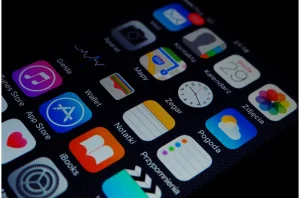The mobile app development landscape has evolved significantly over the past decade, and its future promises even more groundbreaking changes. As smartphones continue to dominate personal and business communication, app developers must stay ahead of emerging trends and technologies to remain competitive. With the rapid advancements in artificial intelligence (AI), machine learning (ML), augmented reality (AR), and blockchain, the future of mobile app development is set to redefine user experiences and app capabilities. In this article, we will explore the most significant trends and innovations shaping the future of mobile app development.
Contents
1. Artificial Intelligence and Machine Learning Integration
AI and ML have already made a huge impact on mobile apps, from voice assistants like Siri and Google Assistant to personalized recommendations in shopping apps. The next wave will see even deeper integration of these technologies. Predictive analytics, facial recognition, and enhanced security measures powered by AI will become standard features across various app categories. AI-based chatbots and virtual assistants are likely to become more advanced, offering real-time customer service and seamless user interactions.
2. 5G Technology and Enhanced Connectivity
With the rollout of 5G networks, the mobile app ecosystem is about to experience a revolution in terms of speed and connectivity. 5G will enable faster data transfer rates, lower latency, and more reliable connections, making real-time apps—such as online gaming, video streaming, and AR/VR apps—more efficient. Developers can build more sophisticated, data-heavy applications without compromising on performance, opening the door for innovations like immersive AR experiences and smart cities.

3. Augmented Reality and Virtual Reality
AR and VR technologies are expected to play a much larger role in mobile app development in the coming years. Companies like Apple and Google have already made significant investments in ARKit and ARCore, respectively, paving the way for more AR-enabled apps. These technologies will be pivotal in industries like retail, gaming, education, and healthcare, offering interactive and immersive experiences. Virtual showrooms, AR-based learning platforms, and telemedicine are just a few examples of how AR and VR can transform the way mobile apps function.
4. Cross-Platform App Development
The demand for cross-platform development tools like Flutter, React Native, and Xamarin is on the rise. These tools allow developers to create apps that function seamlessly across multiple platforms—such as iOS and Android—using a single codebase. As a result, development costs are reduced, and time-to-market is faster. The future of app development will see an increasing number of businesses opting for cross-platform solutions to deliver consistent user experiences across devices.
5. Blockchain and Decentralized Apps (dApps)
Blockchain technology is revolutionizing industries beyond cryptocurrency, and mobile app development is no exception. Decentralized apps, or dApps, built on blockchain networks, offer enhanced security, transparency, and efficiency. These apps are particularly beneficial in sectors such as finance, healthcare, and supply chain management, where data security and integrity are paramount. As blockchain becomes more mainstream, we can expect to see a rise in mobile apps leveraging this technology for secure payments, data storage, and smart contracts.
6. IoT Integration
The Internet of Things (IoT) is another key trend influencing the future of mobile app development. As more devices become interconnected—smart homes, wearables, cars—mobile apps will serve as the control hubs for these IoT ecosystems. The integration of mobile apps with IoT will enhance user convenience by allowing them to monitor and control their devices from their smartphones. Developers will focus on creating intuitive interfaces and ensuring the seamless connectivity of multiple devices within the IoT framework.
7. Focus on Security and Privacy
As mobile apps become increasingly integrated into daily life, concerns about data privacy and security have grown significantly. Users are more aware than ever of the potential risks associated with sharing their personal information, and they expect developers to take proactive measures to safeguard their data. In the future, mobile app developers will prioritize building applications with enhanced security features to address these concerns.
Enhanced Security Features
Developers will implement a variety of advanced security measures to protect user data:
- Multifactor Authentication (MFA): MFA will become a standard practice, requiring users to provide multiple forms of verification before accessing their accounts. This can include a combination of passwords, SMS codes, or biometric data, making unauthorized access significantly more challenging.
- End-to-End Encryption: To ensure that data transmitted between users and servers remains secure, end-to-end encryption will be critical. This technique guarantees that only the intended recipients can read the messages or data being exchanged, rendering intercepted data useless to unauthorized parties.
- Biometric Logins: Features such as fingerprint scanning and facial recognition will be increasingly integrated into mobile apps, offering a convenient yet secure method for user authentication. These biometric measures provide a higher level of security than traditional passwords.
- Behavioral Analytics: Implementing behavior-based security measures will allow apps to analyze user interactions and identify abnormal patterns that may indicate security threats. By leveraging machine learning, developers can enhance real-time threat detection and response.
8. Instant Apps and Progressive Web Apps (PWAs)
Instant Apps and Progressive Web Apps (PWAs) are set to change the way users interact with mobile applications. Instant Apps allow users to try out apps without the need to download them, reducing friction and improving user experiences. PWAs, on the other hand, combine the features of web and mobile apps, offering a fast, reliable, and engaging experience directly from a browser. Both of these app types will gain popularity due to their convenience and flexibility, as they offer lightweight alternatives to traditional apps without compromising on functionality. As an IT Solutions Provider, we specialize in developing Instant Apps and Progressive Web Apps (PWAs) that deliver seamless user experiences and enhance accessibility across devices.
Conclusion
The future of mobile app development is brimming with potential, driven by cutting-edge technologies and ever-evolving user expectations. AI, 5G, AR, blockchain, and IoT are set to redefine the way apps are built and used. Developers who stay on top of these trends and innovations will be better positioned to create apps that offer not only enhanced functionality but also superior user experiences. The next decade in mobile app development is poised to be one of the most exciting yet, with endless possibilities for innovation.

